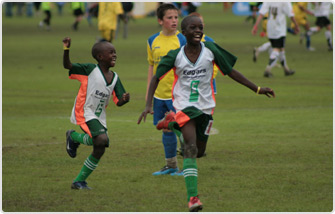Win.
It’s become a taboo word, not just in soccer but in all youth sports. Most recently the debate has become an issue of coaches choosing winning or development, as if they are mutually exclusive. Coaches who develop players the right way don’t have to choose either or because winning and development go hand in hand, but first you will have to understand what “winning” truly means.
The idea we face today that winning doesn’t matter, only development, stems from the extreme “win at all costs” mentality that many involved with any youth sport promote. Because of that extreme, the polar opposite has arisen where we tell our players that winning doesn’t matter, and here is our ultimate issue.
Winning matters. But development matters more.
Let’s understand that. They both matter. There’s a score at the end of the game, there is generally a “winning” team and a “losing” team in games. There’s a reason, however, that there are quotations around both those words. What does winning mean after all? Does winning mean having the better score in a U7 league game? Does winning mean a team that goes unbeaten in Division 1 in their U8 group?
To some, yes. For me, “winning” or more specific a “winning mentality” means players who are hungry and determined to give 100% at improving everything they do. Inspire our youth to be hungry and motivated to improve constantly at whatever they do, and soon the hunger to win games will also develop. Too often, however, we start on the wrong end.
Let’s first look at the argument of why “winning over development” survives to this day, and then let’s look at what the kids think. This is their game, after all.
By the age of 13, 70% of kids involved in organized sports drop out of the game. Often, the reasoning is that they aren’t “having fun anymore” and they’ve lost interest. Here is where “winning at all costs” comes to life. After all, when adults take their own personal experience, winning is always equated to fun. They fondly remember their time as a player, coach, or even spectator, and the elation that came from winning. The equation is simple with the “win at all costs mentality”: If kids aren’t winning, kids will want to drop out because they aren’t having fun. Who enjoys losing?
It’s a poisonous idea that permeates through all aspects of youth sports and is one of the major factors that sees kids dropping out of organized sport at an alarming rate. Read again, the “win at all costs” adultification of youth sports is the most damaging aspect of youth development. Do kids want to win games? Yes, but how long do they dwell on losses as compared to mom and dad?
By the age of 13, around 70% of kids involved in organized sports drop out. It’s a fact worth repeating, and in all this debate, adults are the ones throwing around what kids want. It’s fascinating when a 50 year old is explaining what their seven year old son or daughter wants. Lucky for us, however, someone much smarter than myself decided to do a study where they simply asked kids what exactly they wanted from sports.
The results are fascinating, and incredibly encouraging if you believe in a “winning mentality.” Project Play from the Aspen Institute reports on a study conducted in 2014 by George Washington University where kids were asked why they participate in sports. Over 90 percent of children responded that they participated in sports because it was fun. Fun, however, means a lot of different things for a lot of different people. The children were asked to describe what fun meant for them, and 81 different explanations arose throughout the study.
81 different explanations for what fun means, ranked in order of most important as a response.
Guess where “winning” ends up. Top 5?
Top 10?
Top 20?
Top 40?
Try 48th on the list. Winning was ranked by children as the 48th most important reason to describe fun. Enjoy the important results (courtesy of http://youthreport.projectplay.us/the-8-plays/ask-kids-what-they-want/) here:
Trying your best, being treated with respect by the coach, and getting playing time are the most important factors that kids define fun by. Tournaments and trophies? Not up there, sorry folks. This is fun for one group, certainly, but unfortunately they aren’t the one’s playing.
Trying your best is essentially the idea of giving 100%. It’s that winning mentality, and if we can continue to foster it, we are one step ahead of the game in helping to create “winners.” Kids generally forget about results soon after the game is over. The game is really won or lost, however, in the car ride home. As Project Play explains, kids often forget about the result ten minutes after a game is over, but are often reminded of it constantly in the car-ride home and at dinner that day.
We are responsible for the environment we create for our players and our children. If you think your son or daughter’s value lies in winning a medal at the end of the year, even if they have (which is often the case in “win at all costs” mentality) regressed in technical development or tactical awareness, then you would much prefer playing in division 5 where your team wins 7-0 every game. You’ll get a lot of trophies to put on the mantlepiece, but they’ll all stop after a certain age. The obsession for short term success had decidedly destroyed the long term possibilities for players.
Instead of harping on the most recent scoreline in your league game, why not watch the game and see where your son or daughter could improve. Why not explain to them, as coaches should be doing also, that they have to strive for perfection within themselves before they worry about perfection manifested in scorelines and results. At 7, are we talking about perfection? No, but we are extolling the values of hard work, a never-quit attitude, and always working to get better. That’s what perfection is.

Winning is important, but development is more important. Develop the winning mentality, see kids take ownership of their own technical development, understanding that one hour of practice a week is not enough, and watch the results come, eventually. Eventually is the key word here. Don’t expect this to happen over the course of a week, a season, maybe even a year. Development is not a straight line. Ups will come with downs, and development does not mean constant, unchecked progression.
Watch your teams and watch how they play. Are they encouraged to play out of the back, pass to the keeper, play the ball on the ground and take chances? Mistakes will happen and games will be lost. Does your team kick the ball as far as they can so the striker can score a lot of goals? Mistakes will be minimized and you will undoubtedly win some trophies. Trust in the team that plays the right way and learns from their mistakes, but don’t take my advice for it, I prefer Laureano Ruiz’s explanation, the man who many claim to be the reason behind Barcelona’s playing style:
Let us say that you and I coach two teams with kids that are 10, 11, and 12 years old and all are about equally good. You try to teach them to play good football, a passing game and with tactical basics while I tell mine to only play long balls and try to shoot. I can assure you that at first, I will always win against you, by using your mistakes. Break a bad pass and goal. If we however continue with the same training methods during a three year period, you will most likely win every game against us. Your players will have learned how to play while mine haven’t. That’s how easy it is.
Unfortunately, as many coaches who value proper development know, it isn’t always easy. It takes a village to educate a child. Coaches can and should do their part to ensure they are developing a player for long term success, but we need help from parents to. The environment we create for these players is of the utmost importance.
Next time you’re watching your son or daughter play, forget the result at the end. The result only serves to guide your player on what they need to improve on, nothing more. I have dozens of trophies and medals from my own days playing sports as a youth, and to be completely honest, I barely remember any of them. As a coach, my fondest memory isn’t the victories I’ve had with different teams. Nor is it the playoff appearances, or tournaments I’ve been too or even won.
My fondest memory is much more simple, and much more memorable. It was a text I received a week ago from a former player who thanked me for changing the mentality of the program he was in, and for giving him an experience that was instrumental to his high school career.
The focus wasn’t on short term success. It was always much larger than that.
Develop and win. One comes before the other, and for good reason.
